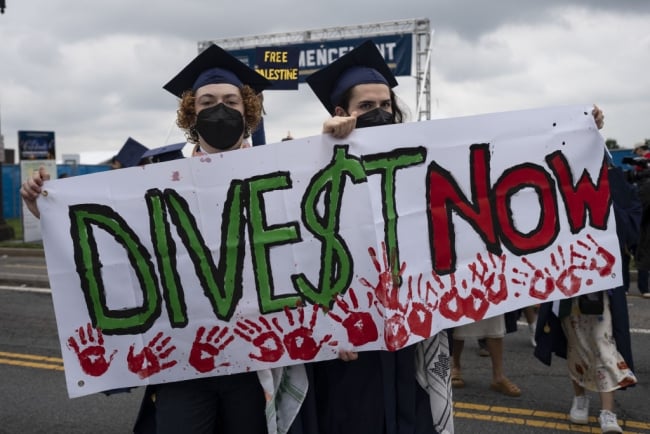You have /5 articles left.
Sign up for a free account or log in.

Some graduates protested at George Washington University’s commencement on Sunday. Numerous institutions across the U.S. are facing demands to disclose endowment funds invested in Israel and companies profiting from the Israel-Hamas war and to divest immediately.
Mostafa Bassim/Anadolu via Getty Images
At pro-Palestinian student encampments on campuses nationwide, a familiar chant—a demand—has rung out: “Disclose, divest, we will not stop, we will not rest.”
Students have used the oft-repeated protest slogan to call for greater transparency in how colleges invest endowment funds and to urge officials to pull institutional dollars from a range of companies that includes weapons manufacturers and consumer favorites. The core grievance for students is that such companies are profiting off the war between Israel and Hamas as civilian deaths mount, with total Palestinian casualties now reportedly numbering upwards of 35,000.
While weapons manufacturers such as Boeing and Lockheed Martin are key targets, so too are Google, Amazon and numerous other megacorporations that do business with the Israeli government or are tangentially tied to companies that work with the military or are otherwise connected to the war effort. In a global economy, the ties can be both numerous and nebulous.
As protests have continued for weeks on some campuses, presidents have taken various approaches to the encampments and to student demands. Some administrators have agreed to weigh divestment requests while others have flatly rebuffed such calls, in some cases suggesting their hands were tied due to state laws. But what would divestment from companies connected to Israel look like—and can it work in today’s complex, international marketplace?
Challenges of Divestment
Factoring institutional values into endowment investment decisions is nothing new.
Some religious institutions have long avoided so-called “sin industries” such as alcohol, tobacco and gambling. Some colleges successfully divested their endowment funds from the war effort in Vietnam in the late 1960s and early 1970s, and from apartheid South Africa in the 1970s and 1980s. More recently, numerous institutions have divested from fossil fuels. Student protests drove divestment in all three cases.
“Most divestment decisions represent responses to shifts in social norms and expectations about what economic activities are acceptable to be supported by a higher education institution’s resources,” Todd Ely, an associate professor of public administration and the director of the Center for Local Government at the University of Colorado at Denver, wrote to Inside Higher Ed by email.
Ely added that while some divestment efforts “might appear to be made purely on a moral basis,” those decisions often “reflect underlying changes in the long-term attractiveness of investing in certain industries” such as fossil fuels and tobacco products, for example.
Colleges can—and do—divest based on both institutional and market values. But even in the face of the encampments that have sprung up from coast to coast, so far only a small number of campus leaders have agreed to consider student divestment demands. And in some cases, such as at Northwestern and Rutgers Universities, weighing divestment demands has attracted the unwanted attention of Congress. Now the presidents of both institutions are headed to Capitol Hill for a hearing on campus antisemitism Thursday that will also include the chancellor of the University of California, Los Angeles.
Neither Northwestern nor Rutgers has divested yet, and UCLA has not agreed to consider the move. Some experts question whether meeting divestment demands is even possible due to laws against the boycott, divestment, sanctions movement and the intricacies of the global economy.
Currently, 35 states have anti-BDS laws, meaning public institutions cannot support efforts to isolate Israel through such tactics. Some higher ed institutions—including Ohio State University—have pointed to anti-BDS laws as a legal barrier to student divestment demands.
Chris Marsicano, an assistant professor of educational studies and public policy at Davidson College and founding director of the College Crisis Initiative, sees anti-BDS laws as a key barrier to potential divestment. Others include administrative concerns about accusations of antisemitism and fear of angering current and future donors by divesting. Then there’s the vast interconnectivity of the global marketplace, where multinational corporations do business beyond borders—including in cyberspace. Fifty years ago, it was much easier for an institution to single out an offending company or two.
“Today's push for divestment from anyone who’s ever done business with Israeli businesses is a much broader request. And it’s much harder to achieve,” Marsicano said. “Another big difference between then and today, especially the South African case, was a lack of complexity that we have now.”
The lines between Israeli and American businesses can be unclear, he noted, pointing to SodaStream, a popular Israeli-founded home carbonation company that PepsiCo bought for $3 billion in 2018. Does that make SodaStream—which is headquartered in Israel and remains a BDS target—an Israeli or American company?
“Israeli businesses are probably harder than weapons manufacturers to divest from. And that is because you have to determine what is an Israeli business,” Marsicano said. “It’s pretty clear when a company is a defense contractor or weapons manufacturer. You know that Raytheon makes bombs; we know that Airbus and Boeing make airplanes. ‘Is a company an Israeli company?’ is a more difficult question because companies are bought and sold all the time.”
What’s more achievable than acceding to a sprawling list of student demands, he believes, is divestment from specific, targeted companies. For example, Brown University’s governing board will vote this fall on a proposal from 2020 that identifies 11 specific companies tied in clear ways to the Israeli government and military.
“It is significantly easier to divest from direct investments in Israel, just like it’s significantly easier to divest from say—as a sector economy—weapons manufacturers,” Marsicano explained.
Mechanics of Divestment
While divestment is possible, some experts believe it is extraordinarily complex. But that hasn’t stopped some institutions from moving forward to explore the matter. Union Theological Seminary in the City of New York appears to be the first U.S. institution to announce its decision to divest from companies profiting off the war between Israel and Hamas.
Union Theological Seminary has long looked to its institutional values to help guide endowment investment decisions, administrators say. They count UTS as one of the earliest higher ed institutions to break from South Africa, and the first to divest from fossil fuels, in 2014. The institution has long used socially responsible investment screens to help guide its endowment decisions.
“We’re very committed to managing our endowment in a way that reflects our values,” Serene Jones, president of Union Theological Seminary, told Inside Higher Ed, adding that the move to divest from those profiting from the war has been received positively both on and off campus.
Jones emphasized that the college was divesting not from Israel but rather from companies profiting off Israel’s war effort. Given its existing screens, which target weapons manufacturers, the private prison industry, fossil fuels and more, Jones believes it’s easier for the seminary than for other colleges to divest. But even with limited investments to worry about, it will be a complicated process.
Jones noted that it involves compiling a list of what the website describes as “companies substantially and intractably benefiting from the war in Palestine that may not be captured by existing screens.” That list is shared with portfolio managers running Union’s roughly $115 million endowment, who then look for overlap with UTS investments. Once those ties are identified, Union will aim to extract itself from any that run afoul of its values. Though she’s unclear on a timeline, Jones expects the process to move somewhat quickly given the prior investment screening.
But for most institutions, Marsicano notes such efforts can be time intensive.
“There’s going to be a level of forensic accounting that happens identifying which companies meet whatever criteria from which you are divesting. That’s going to take some time and it’s consistently ongoing and probably means paying a fee to an endowment manager or broker or some sort of investor to identify those companies,” Marsicano said. “Once those companies are identified, the endowment manager basically sells whatever assets include those companies.”
Ely points to past divestment efforts as an example of how the process typically works. First, the appropriate authority—such as the governing board—must approve divestment proposals and then evaluate the feasibility of dropping a specific stock or entire sector before establishing a plan to do so.
They’re easier to unwind “when the targeted investments are directly held by the college or university (like shares of stock in a company), rather than indirectly held through third-party investment products like mutual funds, exchange-traded funds, and commingled alternative investment funds,” he said. “The indirect holdings may only include very limited exposure to the divestment targets or may even have restrictions on exiting the investments.”
For that reason, some divestment efforts focus only on direct investments, Ely added. Alternatively, some colleges “may plan for indirect investments to be transitioned over time as third-party investments with lock-up provisions expire and guide future indirect investment decisions.” Keeping a list of targeted companies will help screen out new investments.
He also noted that divestment decisions aren’t necessarily permanent. Columbia University—home to the first protest encampment in April demanding divestment—has a long history of walking away from industries targeted by student protesters. In the past, Columbia has divested from South Africa, tobacco, the private prison industry, fossil fuels and Sudan, which it divested from in 2006 over human rights concerns. But within the last few years, Columbia reversed course.
“Importantly, divestment isn’t a static action, since times change and divestment may ultimately prove counterproductive in supporting the initial social objective,” Ely wrote. “Columbia University rescinded its divestment policy targeting companies operating in Sudan, in place from 2006 to 2020, after determining that investment activity and economic stability were needed to help alleviate the human rights abuses that prompted the initial divestment action.”
With colleges across the nation grappling with divestment decisions, Jones of the Union Theological Seminary encouraged leaders not to allow the challenges to guide their decision-making, which she said should be based on institutional—not market—values.
“As a leader of a seminary and a community of moral conscience, I would always encourage people to put issues of this magnitude with respect to conscience out in front and to not hide behind claims about complexity. Yes, it is complex, but if claims of complexity lead to paralysis on moral issues, I fear that institutions of higher education begin to lose their moral bearings,” Jones said.
Meanwhile, college leaders across the country will likely be watching the fallout at Northwestern and Rutgers after their presidents speak before Congress this week about antisemitism. The lawmakers’ scrutiny could make the divestment question even harder to answer.







